Where do web projects live?
The article describes why a web project needs a server, what it is, and how to choose the right one.

CRM System Replatforming for Financial Consultants
More about the serviceCRM System Development
We provide a full range of services for the development and support of online stores, informational websites, CRM/ERP systems, and SEO optimization — from creating technical specifications and prototyping to configuration, launch, and ensuring the quality and stability of your product.
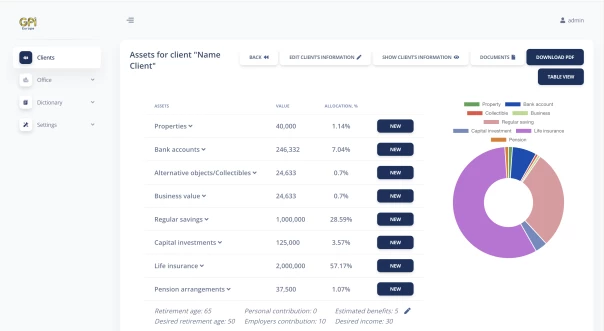
Development and Support of ERP for a Tank Washing and Repair Depot
More about the serviceERP System Development
We develop custom ERP systems — comprehensive solutions for automating and integrating key business processes (finance management, HR, production, supply chain, sales, and more). We provide a full cycle of services: needs analysis and technical specification development, architecture design, system development and integration with existing solutions, implementation with staff training, as well as technical support and regular updates.
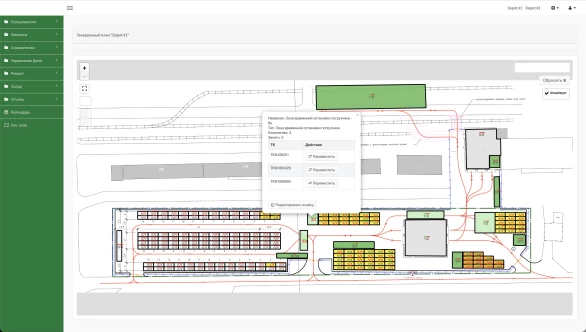
Online stores for beauty professionals.
More about the serviceOnline Store Development
Online store development is a comprehensive process of creating an e‑commerce platform tailored to all client requirements — from preparing technical specifications, prototyping, and design to implementing the website and admin panel, testing, content integration, and ongoing support. This ensures a convenient UX for customers and seamless store operation.

Development of an SEO-optimized informational website for a well drilling company.
More about the serviceDevelopment of informational websites
The development of an informational website is essential for those who aim to showcase their activities online and attract new clients: a modern business card website allows for flexible content updates through an admin panel, displays news and links to social media, and is optimized for search engines, retaining existing audiences and increasing brand trust.
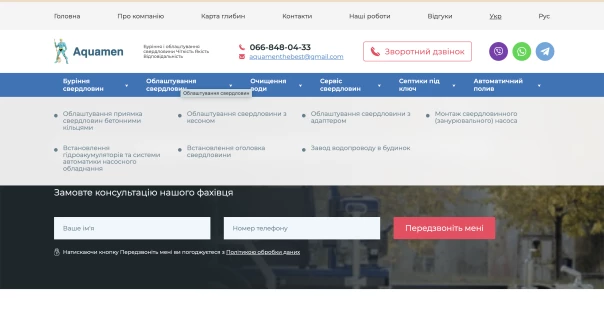
SEO website promotion — boosting visibility and attracting clients from search
We help businesses receive a stable flow of clients from Google. SEO promotion is not just about keywords, but a comprehensive set of work — from technical optimization and content to analytics and link-building.
We create business websites for companies of any size
We develop modern business websites that help present your company, attract new clients, and increase brand trust. These can be landing pages, corporate websites, or multi-page portals with additional functionality.

Content creation — texts, visuals, and videos for your business
We combine the power of artificial intelligence with the expertise of our copywriters, designers, and video editors. We create texts, visuals, and videos that help your brand look professional, communicate effectively, and attract customers.
We create convenient business card websites for companies of any scale
We develop business card websites that help quickly present services, increase recognition, and attract clients. Such websites are ideal for specialists, small companies, or brands that require a compact yet professional online presence.

Content management — professional content creation and support for your website
We take care of all tasks related to content creation, updates, and website structure. Content management is a set of services that includes adding texts, photos, products, news, SEO elements, and keeping your website up to date.

Server administration — stable performance, security, and productivity for your business
We provide full technical server administration to ensure your websites and services run reliably 24/7. Our team has been working for years with Hetzner — one of the most reliable European data centers. We know how to properly configure, optimize, and maintain the infrastructure for your project.
We create intelligent chatbots for Telegram, Viber, WhatsApp, and websites
We develop chatbots that automate customer communication, sales, and technical support. Bots help respond faster, collect requests, accept payments, and operate 24/7 without days off.

Screenshot of the warehouse management module
View Case
ERP system for managing a tank container cleaning and repair station, built on Symfony and deployed on Linux Ubuntu with MySQL for reliability and scalability. The solution includes an administrative panel and a client portal with 49 modules for managing clients, orders, finances, calendar, inventory, and reporting, with capabilities for automatic PDF invoice generation, notifications, and data export to accounting software for complete business process digitalization.

Homepage of the website, VIP announcements block
View Case
A platform for posting announcements in the agricultural sector, connecting farmers, suppliers, and buyers to streamline the buying and selling of agricultural goods and services with increased market transparency and reduced search costs. The system includes an admin panel for moderating announcements, managing content, and analytics, as well as a seller's personal account with the ability to publish and manage announcements and transaction history.
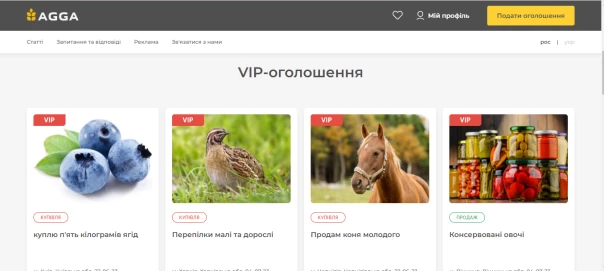
Homepage of the website, VIP announcements block
View Case
A CRM system for a financial consulting company, developed as a custom solution instead of a SaaS product to automate document management and enhance client interaction through admin and client interfaces, with capabilities to manage assets, users, calendars, and dictionaries, generate PDF reports, and synchronize events with Outlook. The project is built on Symfony with PHP 8.3, deployed on Ubuntu 22.04 with a MySQL 8.0 database to ensure system reliability, security, and scalability.

Main Menu of the Project
View Case
Informational website Aquamen for water well drilling services, built with a user‑friendly admin panel for managing users, content blocks, and a feedback module. It supports SEO features (automatic sitemap, no‑index/no‑follow) and sends notifications about new requests via a Telegram bot.

Home Page, Main Menu
View Case
Online store for beauty professionals, developed on Symfony 6.4 and PHP 8.3, deployed on an Ubuntu 22.04 server with a MySQL 8.0 database. It features an intuitive client interface with a product catalog, shopping cart, and order checkout, along with a powerful admin panel for managing products, categories, brands, users, orders, and SEO optimization. The system supports data export and automatic generation of PDF invoices and reports.

Website Home Page, Users, Finance, Learning
View Case
CRM system for a foreign language school designed to efficiently manage student relationships: it enables storing and structuring personal data, course history, and communication records, while automating registration, payment, and class scheduling processes through three key modules — Users, Finance, and Learning.
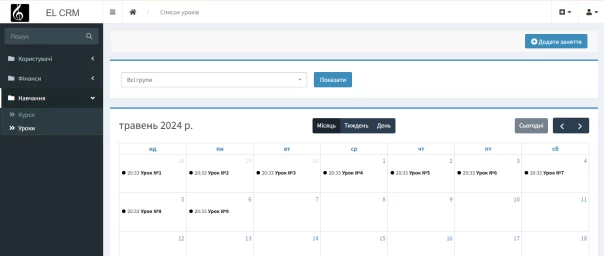
Website Home Page, Users, Finance, Learning
View Case
A custom CRM system for a service business in the truck detailing industry. The solution enables centralized management of clients, services, orders, payments, and staff, automates payroll calculations, and provides detailed business analytics.

Website Home Page, Users, Finance, Learning
View Case
A Telegram bot with an administrative panel was developed for the client, allowing for the automation of order intake, product catalog management, and request processing without operator involvement. The solution is designed for fast customer service and easy management for the business.

Website Home Page, Users, Finance, Learning
View Case
A fast start for your service business: an intuitive client-facing website, easy booking management, and simple service control via the admin panel.

Website Home Page, Users, Finance, Learning
View Case
An interactive web calculator for furniture businesses that allows customers to configure products independently, receive an accurate cost calculation, and generate a detailed PDF report with drawings.

Website Home Page, Users, Finance, Learning
View Case
A ready-made solution for launching an expert business focused on selling services and products. The website structure is adapted for scalable growth, easy content management, and fast project launch.

Informational websites have been widely used for a long time. In the very beginning, the development of an informational website was in demand only to fulfill its main function - to convey a specific message to the end reader. However, modern information resources have much more capabilities than their predecessors.
An informational website is a web resource that contains materials of a relevant nature (informational), oriented towards the reader. The function of such a website is to disclose a certain topic/issue or provide answers to questions. An ideal resource should convey information in such a way that after reading it the reader has no additional questions, remains aware of the latest events, etc.
An informational website can be divided into two broad categories:
Information portals usually have a complex structure, which makes it easy to see the developer's skills. If the website is visually overloaded and it is difficult to navigate through the topics, such a resource clearly needs to be properly updated.
Classifying these resources into specific types will help you understand what an information website is:
Personal blogs are also informational websites, but they are more focused on feedback from the reader.
An informational website is a place where users find answers to their questions. This principle underlies the entire process of their creation, so it is important to build in opportunities for user engagement at the stage of website development.
If the website does not appear in search results, news feeds (such as Google Discover), and other possible channels of user engagement, such a resource will not fulfill its main function, despite the fact that the cost of developing this type of website is relatively high.
Main differences from other resources:
The key difference between informational web resources is their purpose. While commercial sites are focused on sales, informational websites are focused on presenting content - this is the primary task.
Typical examples of such websites:
Wikipedia is a standard example of a public encyclopedia;
In fact, the examples of informational websites are far from being limited to those described above. Any place where a reader can get useful information on a given topic and get an answer can be considered an informational one.
We have considered one side, namely, providing users with the necessary content. However, a modern informational website can also combine a commercial component.
The main source of monetization is advertising. This is the content of third-party advertisers who have chosen this website as a platform for their offer. For a resource to be profitable, the following conditions must be met:
An informational website can generate relatively large profits, the main thing is to properly implement the development and promotion of such a product.

The article describes why a web project needs a server, what it is, and how to choose the right one.

A modern blog – is something more than just an online diary. Today, it should be seen as a powerful marketing tool, without which competent brand promotion to the masses is impossible. Read on to learn more about the specifics of running a business blog.

Nowadays, in the age of modern technology it’s very important to keep up with the leading forms of your business presenting. A fence posting no longer brings the desired involvement of people in your business. It is important to have your own website to make your idea recognizable and popular.
Fill out the form to receive a free consultation
